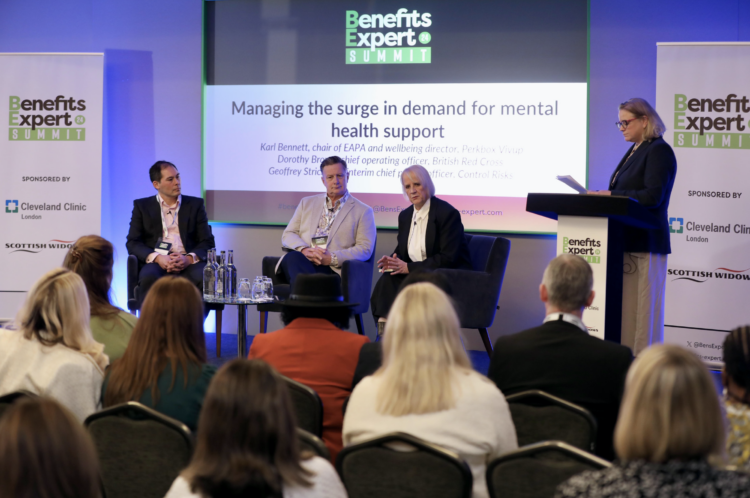Addressing mental health in the workplace is critical, with a focus on proactive, tailored support strategies to prevent disengagement, burnout, and the financial and operational costs of poor mental wellbeing.
This was the main conclusion of a Benefits Expert summit panel discussion with Dorothy Brown, chief operating officer at British Red Cross, Karl Bennett, chair of EAPA and wellbeing director at Perkbox Vivup and Geoffrey Strickland, interim chief people officer at global risk consultancy Control Risks.
The discussion focused on the increasing importance of mental health in the workplace. It emphasised the need for businesses to understand the factors influencing employee mental health and the consequences poor mental health can have on business performance. The panel explored the costs of inaction and highlighted effective strategies for supporting mental health across various demographic groups.
Brown said that the demands of humanitarian work, financial strain from the cost-of-living crisis, and internal organisational changes are all contributing to the British Red Cross’s growing mental health issues among its employees.
Brown said: “Our mental health demands are really a result of context: what’s happening in personal lives, what’s happening in the organisation because we’re going through huge change ourselves. It’s just this constant demand for people thinking they have to have all the answers.”
The biggest influence on employee mental health, according to Bennett, is caused by a bad corporate culture, specifically a lack of communication, belonging, and value. He also mentioned cost-of-living constraints, organisational changes, and an “always-on” culture as major obstacles.
He said: “The one thing that’s impacting employees more than anything else at the moment is organisational culture. That feeling of belonging, that feeling of value. And if organisations aren’t communicating that well, then it impacts people’s mental health greatly.”
Strickland emphasised the wide range of effects on mental health, from the stress on workers in high-risk positions, including negotiating kidnappings, to the concern of recent grads about going back to work after the pandemic. These challenges are being exacerbated by the rising number of kidnappings, particularly in the Middle East and Latin America.
Bennett also emphasised that instead of assuming what employees need, businesses should connect with them to understand their issues. According to him, many organisations provided generic wellbeing services throughout the pandemic, which resulted in inadequate solutions. According to Bennett, absenteeism, disagreement, and disengagement are early indicators of mental health problems. He underlined that the key to proactively tackling these issues is data-driven initiatives and transparent communication.
Strickland highlighted that employee disengagement happens when staff members feel unsupported, which in turn results in financial expenses, and he identified the largest cost to the organisation as a cultural one. He also discussed how difficult it can be to manage mental health in the workplace, pointing out that different viewpoints, including those of senior employees with police or military experience, can cause misunderstandings and lower employee engagement.
Brown stressed that the Red Cross cannot function effectively in crisis areas unless it supports the mental health of its employees. The ability of the organisation to carry out its mission is compromised if staff are not supported. Burnout, a prevalent problem in the nonprofit sector, is a serious concern, particularly when employees put in extra hours.
She said: “If we’re not looking after our own people’s mental health so they can do those really difficult things, they are seeing and working with some very traumatised people, we can’t do our job, so it’s even more fundamental. If we’re not careful, people will get burnt out and then we can’t do anything.”
Strickland emphasised the success of Control Risks’ initiatives for mental health, such as the Employee Assistance Program (EAP) and mental health champions, which promote open communication and minimise stigma. He stressed how crucial it is to provide a safe space where staff members may talk openly about their mental health.
Bennett agreed that EAPs were the best course of action, but he added that although they work effectively for employees experiencing a crisis, they mostly address issues after the decline in wellbeing has already begun. In order to avoid crises and concentrate on helping staff members before they require crisis intervention, he stressed the necessity of proactive wellbeing initiatives like flexible working and mental health first aid. According to him, participation in these preventative services should be used to gauge success, rather than the use of EAPs.













